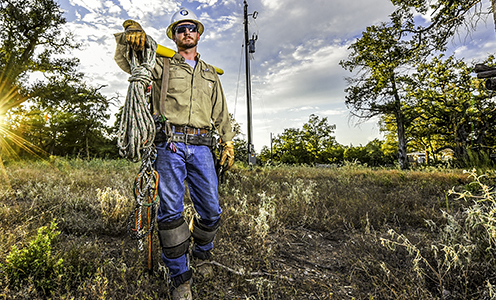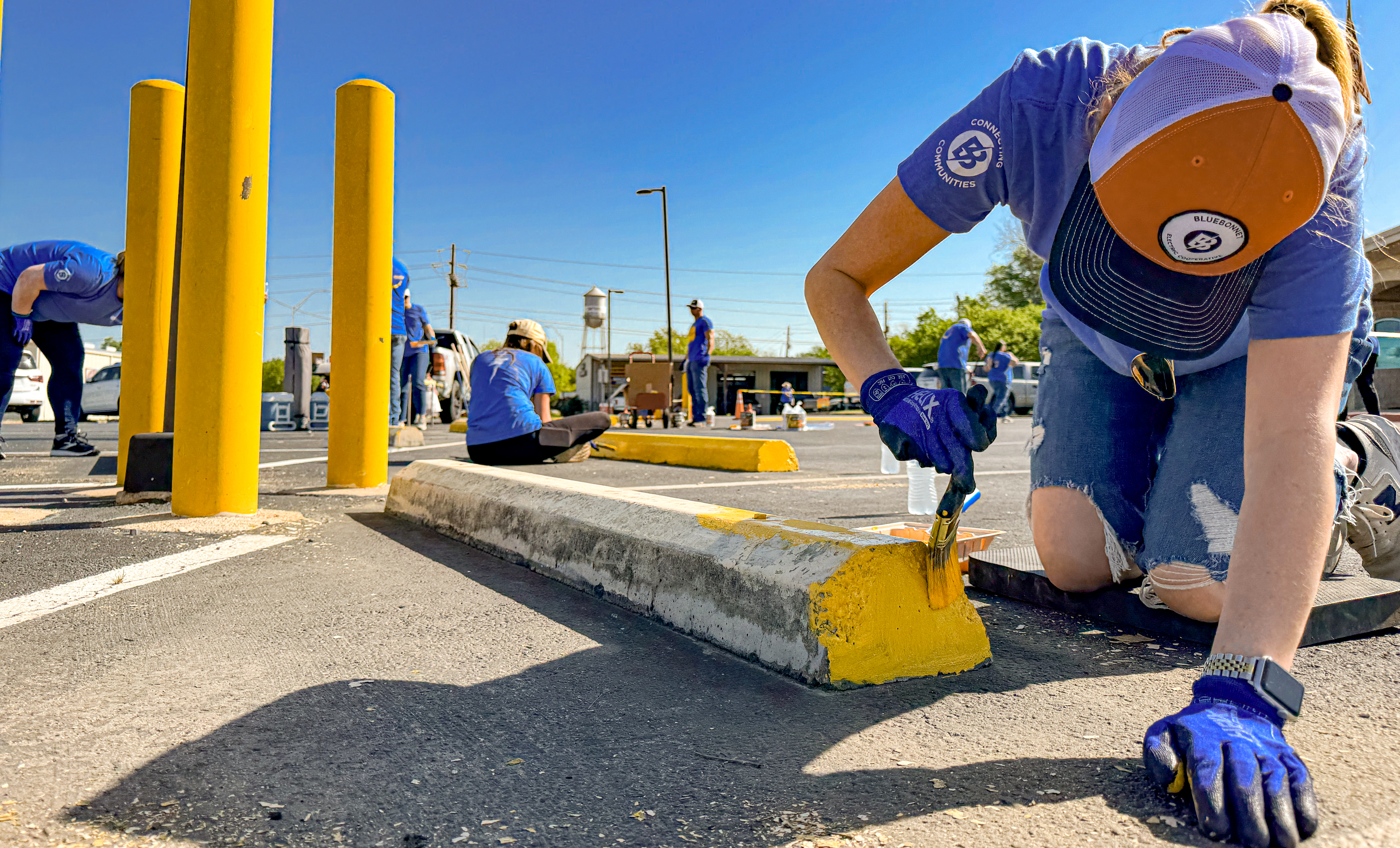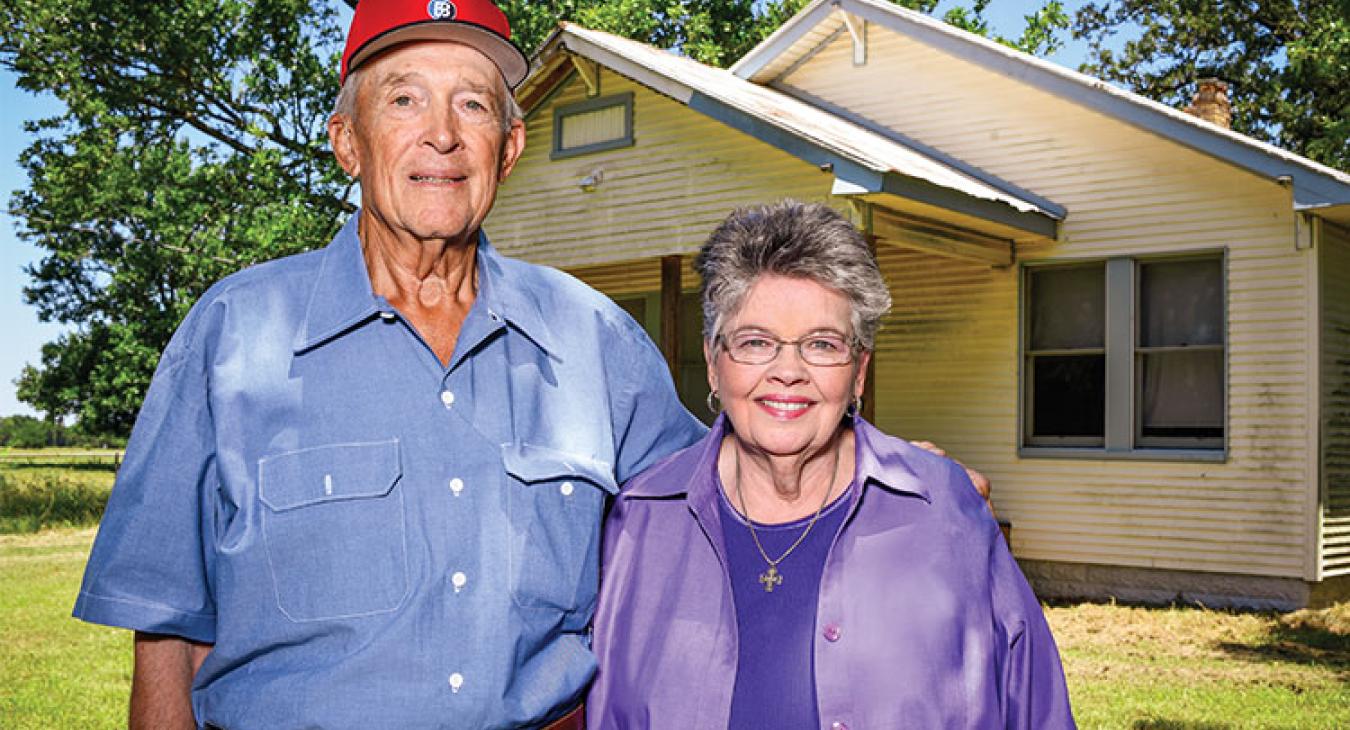Oscar Dube Jr. and his wife, Loretta, recently visited the family farmhouse on Wolf Road in McDade, half a mile from their current ranch home. (Sarah Beal photo)
At First Light: Remembering the Dawn of Electricity
This is one in a series of stories about some of Bluebonnet Electric Cooperative’s earliest residential members
By Clayton Stromberger
Oscar Herman Dube worked hard. He was known for it. As a youth growing up in the rolling farmlands of northeastern Bastrop County, between McDade and the Lee County line, he would hitch up a mule early in the morning at his parents’ farmhouse and head off to plow the nearby cotton and corn fields for 50 cents a day, often keeping at it until the light faded.
“From sunup to sundown,” says his son, Oscar Herman Dube Jr., 79, who lives with his wife, Loretta, in a ranch house just half a mile south of the land where his father grew up. “Long days. There were three boys and two girls (in Oscar Sr.’s family), and they didn’t have a whole lot to eat, often just homemade bread and homemade syrup. They said that sometimes he’d be so tired that he would fall asleep and his face would fall in the plate, and it would stick to it because of all the syrup.”
A gritty perseverance came naturally to Oscar Sr. He was the direct descendant of Wendish immigrants on his father’s side – the Dubes (pronounced Du-bee) – and also on his mother’s side, the Wolfs. The Wends were people of Slavic descent who lived in eastern Germany and chose to immigrate to the United States for a variety of reasons, including religious and cultural freedom and economic opportunity.
Members of both the Dube and Wolf families were among the famous group of 600 Wends who decided to sail for Texas in 1854, led by their Lutheran pastor. They suffered many hardships and losses along the way: Oscar Sr.’s great-grandfather, Michael Dube, died of cholera and was buried in Ireland; his great-grandmother, Rosina Dube, carried on to Galveston with their 10 children. One child died in Houston – the first Wend, according to family history books, to die on Texas soil.
The surviving Wends founded the community of Serbia, southwest of Giddings in southwestern Lee County, and gradually dispersed to outlying farm areas, including Fedor in north central Lee County and the land around McDade. Members of the Dube and Wolf families arrived in the McDade area in about the 1870s, Oscar Jr. says. The fact that both a Dube Lane and a Wolf Road wind through this quiet rural area attests to the early importance of those families to the region.
Oscar Dube Sr. – born in 1899, on the cusp of the 20th century – grew up in a world where electricity was something folks had in the big cities. It was not a part of the landscape as far as the eye could see. But as advances in technology began to work their way into the countryside, Oscar Sr. eagerly embraced them, his son says – even if it took a while to adjust to the new ways.
“When he got his first car, he was used to telling his mules to stop at the gate,” Oscar Jr. says with a grin. “So the first time driving his new car, he told it to stop at the gate: ‘Whoa!’ It didn’t stop. It just broke right through.”
When news hit the area that the Lower Colorado River Electric Cooperative (later renamed Bluebonnet Electric Cooperative) was taking applications for electric service, Oscar Dube Sr. didn’t waste time. His original application form, preserved in the Bluebonnet archives for four generations, is dated March 8, 1940, for his newly built farmhouse on Wolf Road. On his form, which listed potential appliances that would need electrical wiring in the home, Oscar Sr. put a check mark next to a radio, washing machine, electric range and water heater.
For Oscar Sr., 1940 was a momentous year. Aside from building his house with the help of a friend and signing up for electricity, at age 41 he married Alma Wiede, who grew up on a farm in Clifton, near Waco. They met at the wedding of a friend of Oscar Sr.’s, at which he was the best man and Alma was the maid of honor. The final big personal event of 1940 was the birth of young Oscar Jr. in November, probably within a month or two after the lights came on. (The co-op contract allowed six months for service to be provided).
A daughter, Martha, was born in 1943. Martha (Dube) Berry, who now lives in Austin, remembers how everyone pitched in on the farm. It taught her the value of hard work, she says.
“I remember hoeing in the watermelon patch and driving the tractor when my brother and father would pull corn,” Berry says. “And I did that when I was very young. That was my job in the summertime. I remember we raised black-eyed peas and cream peas, and one morning I picked 90 pounds of peas. We all did whatever we needed to do.”
Oscar Jr. recalls that even with a few new appliances as the 1940s went along, life was still rugged on the farm by today’s standards.
“When I look back, it's hard to believe how my father made a living,” Oscar Jr. says. “But all of the families around us, we were all in the same boat, so to speak. None of us had any money. We lived off the farm. It was hard. We didn't get a tractor until about 1947. We had our own chickens, and our own hogs that we butchered, and calves, and sheep, too. And a big garden. Dad raised some hogs and some cattle, and that's about what he did."
Though the Wends spoke their native Sorbian, they also spoke German, and that was the primary language in the household until Oscar Jr. started going to school, where English was required, he recalls. Alma had grown up speaking German in her family as well. Even after that, German was often spoken at night in the Dube home after the kids went to bed. Gradually the Sorbian faded away.
Before electricity, Alma cleaned clothes using a washpot and a rubboard, and the couple used kerosene and coal oil lamps. Oscar Jr. and Loretta still have one of the lamps. Christmas meant a box of apples from a store in McDade and one toy.
“That house had a wood cookstove,” Oscar Jr. says, “and a wood heater. This will sound strange to you, probably, but we just had a bath about once a week — and we'd take a bath in the kitchen. This cookstove had a water reservoir, so that's where we had the warm water for our bath. And we didn't have a bathroom in the house. We finally had a bathroom built, but it just had a commode — before that, just an outhouse. We didn't have a bathtub until I was a sophomore in high school” in 1957.
Young Oscar Jr.’s mother canned everything, including meat, as she’d done growing up in Clifton. In the 1950s, Oscar Sr. got into the business of raising hatching eggs and ended up tending 4,000 chickens. “Dad worked really hard,” Oscar Jr. recalls, “and he had the highest hatching rate in Bastrop County.” The chickens were the only residents that had any form of air conditioning – foggers and fans. Oscar Jr. put a hammock in the chicken house so he could cool off after lunch.
Eventually, the new appliances came – first, a refrigerator, and then a big boxy radio to replace the battery-powered one, and then a washing machine and an electric stove. Oscar Jr. remembers how his parents would store fresh milk and butter in the refrigerator, and the smell of Alma’s fresh-baked bread would often waft up from the new oven.
Then, in 1953, when Oscar Jr. was 13, something new replaced the boxy radio as the center of family entertainment.
“My sister and I just couldn’t get over it — it was a television,” he remembers, and his father was in charge of it, especially on Sunday evenings. Sunday was the one day Oscar Sr. didn’t work. The day often began with a half-hour morning journey in the 1945 Chevy on sandy back roads to Fedor for Lutheran services, and continued with an afternoon visiting with neighbors under shady trees, and then family supper at the dining table. Only then would Oscar Sr. pull the set out to the front porch and the family would watch TV. Oscar Sr. twisted the antenna to bring in different stations from around Central Texas. In later years, Oscar Jr. remembers, his father loved to watch wrestling. The whole family loved watching "Gunsmoke" and other westerns.
The younger Dubes have kept the old family farmhouse in good shape, though no one lives in it. It sits quietly in a field at a little turn in Wolf Road, surrounded by the old chicken sheds in the meadow and Oscar Sr.’s old pickup. Some of Oscar Jr.’s cattle graze nearby. He can look through the side window of the old house and see where he sat for supper at the table, which is still there, too.
“I had to sit next to the drafty window,” he says with a smile during a recent visit to the old farmhouse. “It wasn’t such a great spot.” Behind him, next to the old house, stands a grey power pole. A line runs from the top of it to the house, carrying electricity, because sometimes Oscar Jr. uses the old water pump next to the house to get water to the cattle.
Oscar Jr. and Loretta married in 1963. Loretta, who grew up in West Austin on Jefferson Street, remembers the first time she came out to the country to visit Oscar Jr.’s family at this house. It was winter, and the woodstove was having a hard time keeping up. “It was so cold I used five quilts,” she says.
In his late 80s, Oscar Sr. continued to put on his work boots and walk his fields, searching for work to do. In the end, as his memory began to fail, the family had to take Oscar Sr.’s boots away: It was the only way to keep him from going out to check on the field, where he would sometimes get lost. Eventually Oscar Jr., Loretta, Martha and her late husband, Weldon Berry, moved Oscar Sr. and Alma to a house in Austin to care for them. Oscar Sr. died in 1992 at age 92; Alma died four years later at age 89.
Oscar Jr. and Loretta had long and successful careers running an office supply company. After selling the company in 1997, they bought their Bastrop County ranch property — by luck, a ranch and house were available adjacent to the family lands — and began living on it in 1998. The gate at the entrance to the property announces it as “L & O Dube Ranch.” Their two children and their grandchildren visit as often as they can. Everyone in the family, including Martha Berry, her husband Weldon Berry, and their two children and grandson, agreed that the old farmhouse and the Dube land should be preserved for future generations.
“It really means a lot to me when I go down to see the house and occasionally walk through it and think of the memories,” Martha Berry says. “I’m glad it’s still standing.”
“Our son and daughter and their children just love it down here,” Oscar Jr. says, as a gentle breeze blows through the post oak trees on a hot day. “My son, who lives in Austin, he’ll sit on the back porch all day. He says, ‘It’s just like heaven.’ "
Download this story as it appeared in the Texas Co-op Power magazine »





